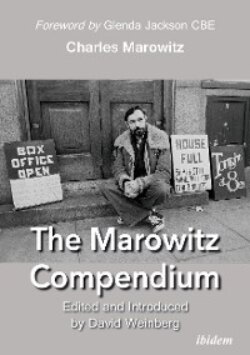The Marowitz Compendium

Реклама. ООО «ЛитРес», ИНН: 7719571260.
Оглавление
Charles Marowitz. The Marowitz Compendium
Books by Charles Marowitz
List of Contributors
Foreword by Glenda Jackson CBE
Introduction
Volume II
Biography of Charles Marowitz. 1932–2014. Early Years
London
In-Stage
Theatre of Cruelty
London Traverse
Open Space
Marowitz as Thinker
Outline of the Book. Introduction
Part One: OUT OF THE MELTING POT (2014)
Part Two: PRODUCTION DIARIES. RSC Theatre of Cruelty (1966)
Picasso’s ‘The Four Little Girls’ (1973)
The Sherlock File (1987)
Part Three: PLAYS. The Marowitz Hamlet (1968)
Tea with Lady Bracknell (1981)
Epilogue. Remembering Charles Marowitz, by Thelma Holt CBE (2014)
Appendix
Acknowledgements
Notes
Part One. OUT OF THE MELTING POT (Four Excerpts) PLEASE NOTE
Preface to: OUT OF THE MELTING POT
Dumped in the Melting Pot
The Golden Year
Harold Pinter: Pinteresque until the End
Working with Havel
Part Two. PRODUCTION DIARIES. Notes on the Theatre of Cruelty (1966)
The Auditions
Disrupted Set-Piece:
Text & Sub-Text:
Object Associations:
Discontinuous Improvisation:
The First Company
Introduction to Sounds:
Sound and Movement Similes:
Discontinuity:
A Collage Hamlet
Contact
Group Interview:
Improvs & Essentials:
Stanislavski and Artaud
Changing Gears:
Actors & Actors
Speak with Paints:
Theatre of Cruelty
Phase Two
The Screens:
Brook in Perspective: A Digression
Marat/Sade and Completion
Picasso‘s Four Little Girls (1972)
Review of The Four Little Girls: Positive (CM)
Review of The Four Little Girls: Negative (CM)
The Sherlock File (1987)
Part Three. PLAYS. The Marowitz Hamlet (1968)
Introduction
Five Questions and a Proposition
Words and Actions
Fortinbras and Hamlet: Jekyll and Hyde
Ophelia = Lolita
The Ghost
Hamlet as Buffo
Open Letter to Horatio
Hamlet as Myth
Somewhere in Elsinore
Tips for Set-Designers Re THE COLLAGE
Hamlet and Discontinuity
Short Background
The Collage
Tea with Lady Bracknell (1981)
Epilogue. Marowitz Remembered (2014)
Appendices. Artaud at Rodez (1972)
Conversation with Gaston Ferdiere
Conversation with Roger Blin
Conversation with Arthur Adamov
Отрывок из книги
ibidem-Press, Stuttgart
—William S. Burroughs
.....
These changes were intertwined with his own personal journey as well as contemporaneous events. Marowitz experienced the advent of Off Broadway firsthand as a youth in Greenwich Village and as a theatre critic for the Village Voice climbing fire escapes and attending unconventional performances in unconventional locales. His move to Britain during the watershed year of 1956 combined with his iconoclasm and his pattern of confronting established practices and institutions were perhaps in some way emblematic of the changes in the theatre itself during the period.
During the earlier period of his career Marowitz was caught up in prevailing theatrical preoccupations of the day. During the 1960s his theatrical temperament transformed from an interest in applying Stanislavski’s methodology to the ideas of Artaud whom he first read in 1958. In his own sensibility Marowitz shifted away from socially committed plays and ideology to an emphasis on aesthetic innovation and metaphysical exploration. In particular, when he was working with the Traverse he found that there was a predominant emphasis on new writing. He decided that no amount of new writing would really change theatre itself or free it from a state of aesthetic obsolescence so he began to search for new forms and techniques which would transcend the mundane and the temporal (Marowitz 1973: 8-9). He became committed to the creation of a collective instrument based around the idea of a permanent company. Working collectively in collaboration with a director but without specific reference to a single playwright per se would, in his view, by virtue of its artistic chemistry, create a new and original kind of artistic specimen that was more efficacious than the written word itself (Marowitz, Interview, 2011). It was in order to realise this vision that Marowitz originally collaborated with Peter Brook on the Theatre of Cruelty season in 1963/64, which effectively popularised the ideas of Artaud within contemporary theatre. He created the Open Space Theatre Company in 1968 which was the only example in Britain of a laboratory company run on a repertory basis. Marowitz’s development in this direction started with his experience of the Group Theatre and the emergence of the ‘American Method’ or rather American derivations of Stanislavski. In particular, Stanislavski-based improvisational techniques were an important formative influence on Marowitz.
.....